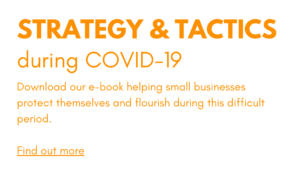Using Data To Get Ahead: Interview With Cultural Marketing Agency Translate Culture
Translate Culture is a digital marketing agency that helps brands leverage the power of data, culture and storytelling. Founder Masibu Manima has been working in the realms of data and marketing for the past ten years and, we recently spoke to him on Instagram Live about how small businesses can navigate COVID-19.

First thing’s first: what is ‘data’ and how can small businesses access theirs?
I always say that data is like ‘magic breadcrumbs’ – micro-clues as to who is engaging with your site and how they’re interacting. I advise new businesses, prior to launching their website, to install some form of tracking like Google Analytics, as this is essential for piecing together data and building an understanding of what’s been happening on your platform.
How did you work with Bespoke Binny to optimise their online business?
Bespoke Binny [founded by Mas’ wife Natalie, which sells handmade African-print homeware items] launched on Etsy and initially invested a lot of time trading at African-themed market stalls, because these were the platforms Natalie had access to. However, through studying the data from Etsy, we realised that she had a base of customers who weren’t necessarily from the African diaspora but just loved the bold, colourful prints.
I also looked at three years’ worth of historical site data and was able to see where Bespoke Binny was making and losing money, and what the maximum was that customers were willing to pay for an item. We tested all these findings by adjusting the brand’s tone of voice for this different customer base, updating the product photography and increasing the price point of the items. As a result, Natalie grew her audience tremendously, even with higher prices.
Despite coronavirus, people are still shopping online. How do small businesses need to adjust their marketing strategies for the circumstances?
The current situation is unprecedented in our lifetime. In terms of messaging, I’d advise businesses to be mindful of what their customers might be going through and the pressures they could be facing, and be as sensitive to that sentiment as possible. Many brands have been releasing statements on how they are dealing with COVID-19 and while this was good at first, it has become a bit like a GDPR spam – I’d recommend going with your gut and avoiding being opportunistic by creating comms like these.
Review any automated marketing campaigns or emails you have scheduled to see if the tone of voice is appropriate for the circumstances. Beyond that, focusing on brand awareness right now is a great way to go, even if it doesn’t result in immediate conversions.
As a great example of brand awareness, at some point last year I saw an ad for masks featuring a black family living in San Francisco, where urban air pollution is a huge concern. I didn’t need the mask at the time, but having a daughter myself, the ad resonated with me because it aligned with my own story. And so, when I recently did need to buy some masks, it was this company that came to mind, so many months after I had originally seen their ad. This is the power of brand awareness.
What’s your advice for events companies who’ve had to cancel all their future events? How can they authentically serve audiences online?
So many events have had to be cancelled due to COVID-19, including my own. It’s tough as events so often depend on physical interaction to be successful, but tools like Hopin.to, Zoom, Skype and Instagram Live allow you optimise the digital experience.
For the time being, be as transparent as possible with your customers about what you’re going through as a business. When things go back to normal, it’s likely many virtual events will have been successful but there will always be value in physical gatherings. It’s a balancing act.

Given your look at the data and your professional opinion, what do you think is going to happen over the next 3 months or the next year? What new trends might emerge and what types of businesses do you think will be the ‘winners’ of this crisis?
Right now, people are thinking about security in terms of their job and their income. I imagine we’ll start seeing people looking for new side hustles as a way to make money for a rainy day by learning something new or monetising their current activities. Similarly, many traditionally ‘offline’ businesses are having to move online and they may realise they can actually have sustainable success in this space. I expect to see a shift as both people and brands look for ways they can diversify.
What’s the best piece of advice you can give?
Take maximum advantage of the data you have at your disposal. If you own a website, use a tracking tool such as Google Analytics to capture the data and know exactly what is happening on your platform. Make sure all your online marketing content is trackable – such as online ads – because this information will be a goldmine if you ever want to work with a digital marketing expert.

